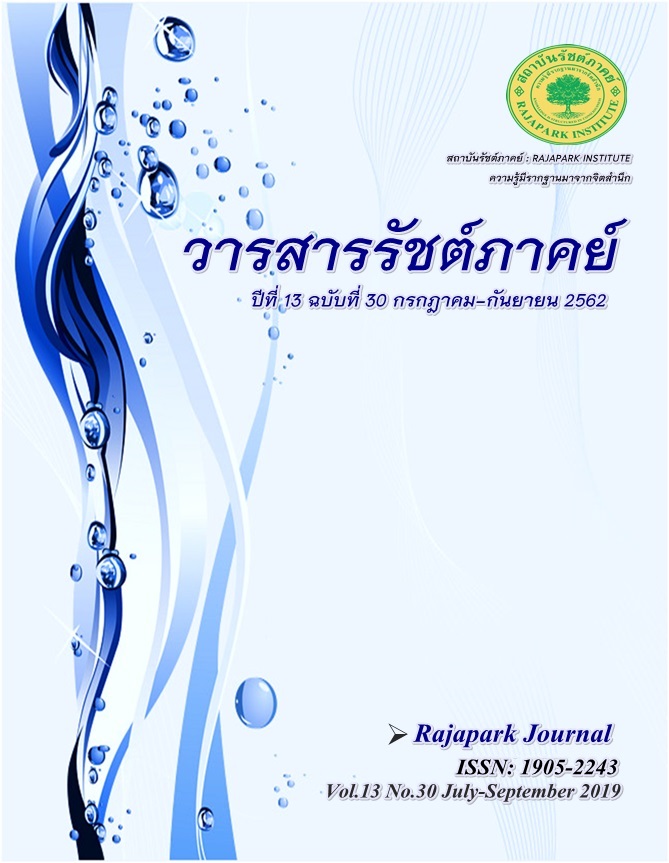The development of communication Fund groups in the political system after the 2006 -2014 coup
Main Article Content
Abstract
The objective of this study is to study the influence of business communication that has an impact on Thai Rak Thai Party. This is a qualitative research by analyzing documents from the Thaksin Cognitive Books 1 – 2, Corruption cases of Dr. Surapong Suebwonglee, Case of land in Ratchada, and IPSTAR satellite case analyzed by Somchai Sawaengkarn. The research found that the fact that only a few large business leaders who succeed in using political money, take advantages from the power and destroy the parliamentary system. This causes both direct and indirect impacts on Thai political system. Thai politics requires funding, which comes from the large capital group of the communication business who explicitly support politics. And this group was affected by the coup. For example, the free TV channels were most affected because the business operation was controlled, causing the decreasing of Income for political reasons. This is because the coup thought that if the free TV channels were not controlled, it will cause resistance and lead to political change. On the other hand, Mobile Business has the least effect and also able to continue conduct the business so this group has occupied the market still.
Article Details

This work is licensed under a Creative Commons Attribution-NonCommercial-NoDerivatives 4.0 International License.
Views and opinions appearing in the Journal it is the responsibility of the author of the article, and does not constitute the view and responsibility of the editorial team.
References
Samudavanija, C. (2011). Online manager. Retrieved August 20, 2018, from https://www.manager.co.th/Home/preload_501.html
Constitution Act, Political Party B.E. 2551 (2008).
Constitution of the Kingdom of Thailand B.E. 2540 (1997).
Pinthong, J. et al. (2004). Thaksin 1. Bangkok: Publishers.
Pinthong, J. et al. (2009). Thaksin 2. Bangkok: Publishers.
Kaewthep, K. (2009). Mass Communication: Theories and Guidelines for Education. Bangkok: Photo Print.
Nanthawaropas, N. (2005). Political Communication: A Case Study of the General Election Campaign Thai Rak Thai Party. Doctor of Philosophy Thesis. Thammasat University, Faculty of Journalism and mass communication.
Waitoolkiat, N., & Chambers, P. (2015). The Resilience of Monarchised Military. Thailand Journal of Contemporary Asia, 46(3), 1-20. DOI: 10.1080/00472336.2016.1161060
National Bureau of Agricultural Commodity and Food Standards. (2018). Operational manual to protect interests stacking. Bangkok: Author.
Phongphaijit, P. (2004). Reading Thai political culture. Bangkok: Matichon.
Phongphaijit, P. (2005). “Money Politics” Lecture leading the annual seminar on Money Politics. By Political Economics Studies Center, Chulalongkorn University.
Phongphaijit, P. (2006). Thai Capital Dynamics and the Guidelines for Thai Political Economy Reform: Experimental Proposal Political economic reform from the framework of the city affairs analysis. Same sky, 4(3), 74, 72-110.
Nakornthorn, P. (2018). Matichon Newspaper. Retrieved August 20, 2018, from https://mgronline.com/daily/detail/9540000095044
Netinant, P. (2009). Brand communication process of Thai political parties. Retrieved August 10, 2018, from https://wiki.kpi.ac.th/index.php?title
Noksuan Sawasdee, S. (2010). Democracy really works: Thai people guide the 2011 election. Bangkok: Two Four Printing.
Noksuan Sawasdee, S. (2017). The path to democracy that is not reversed: political institution factors Strong Democracy. Faculty of Political Science, Chulalongkorn University.


